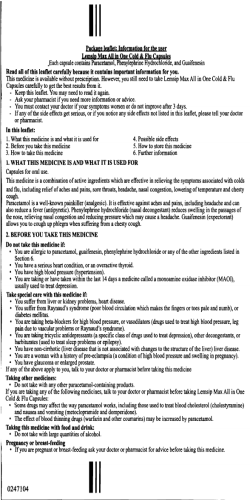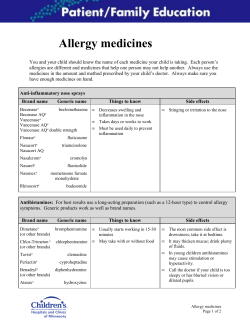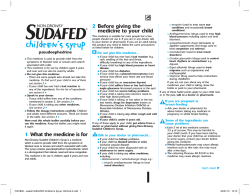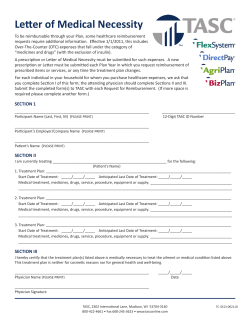
Sporanox 100 mg capsules Itraconazole
PACKAGE LEAFLET: INFORMATION FOR THE USER Sporanox® 100 mg capsules Itraconazole Sporanox is a registered trademark Read all of this leaflet carefully before you start taking this medicine because it contains important information for you. Keep this leaflet. You may need to read it again If you have any further questions, ask your doctor or pharmacist This medicine has been prescribed for you only. Do not pass it on to others. It may harm them, even if their signs of illness are the same as yours If you get any side effects, talk to your doctor or pharmacist. This includes any possible side effects not listed in this leaflet. See section 4. What is in this leaflet 1. What Sporanox capsules are and what they are used for 2. What you need to know before you take Sporanox capsules 3. How to take Sporanox capsules 4. Possible side effects 5. How to store Sporanox capsules 6. Contents of the pack and other information 1. What Sporanox capsules are and what they are used for Sporanox capsules contain a medicine called itraconazole. This belongs to a group of medicines called ‘antifungals’. Sporanox capsules are used for infections caused by fungi or yeasts in adults. They are used for: Infections of the mouth or vagina causing ‘thrush’ Skin infections Infections affecting other parts of the body Patches of skin may take a few weeks to completely clear up after you have finished your treatment with Sporanox capsules. Finger and toe nails may take several months to completely clear up. This is because your skin or nail will only look normal after new skin or nail has grown, even though the medicine has killed the fungus that caused the infection. 2. What you need to know before you take Sporanox capsules Do not take Sporanox capsules: If you are allergic to anything in Sporanox capsules (listed in section 6 below) If you are pregnant or could become pregnant unless your doctor has told you to (see ‘Pregnancy and breast-feeding’ below) Do not takethis medicine if any of the above applies to you. If you are not sure, talk to your doctor or pharmacist before taking Sporanox capsules. Warnings and precautions Talk to your doctor or pharmacist before taking this medicine: If you have ever had kidney problems. Your dose of Sporanox capsules may have to be changed If you have ever had liver problems such as yellow skin (jaundice). Your dose of Sporanox capsules may have to be changed. If after taking this medicine you have a severe lack of appetite, feel sick (nausea), are sick (vomiting), feel unusually tired, get stomach pain, muscle weakness, yellowing of the skin or whites of the eyes, unusually dark urine, pale stools or hair loss, stop taking Sporanox capsules and tell your doctor straight away If you have ever had a heart problem including heart failure (also called congestive heart failure or CHF). Sporanox capsules could make it worse. If after taking this medicine you get any of the following: shortness of breath unexpected weight gain swelling of your legs or tummy feel unusually tired wake up short of breath at night stop taking Sporanox capsules and tell your doctor straight away. These may be signs of heart failure If you have Acquired Immunodeficiency Syndrome (AIDS) or your immune system is not working as well as it should If you have had an allergic reaction to another antifungal product in the past If you are not sure if any of the above applies to you, talk to your doctor or pharmacist before taking Sporanox capsules. Children and the elderly Sporanox capsules are not normally given to children under the age of 12 or the elderly. However, your doctor may prescribe them in special cases. Blood tests If your Sporanox capsules course is for more than one month, your doctor may want to check your liver by testing your blood. Other medicines and Sporanox capsules Tell your doctor or pharmacist if you are taking or have recently taken or might take any other medicines. This includes medicines that you buy without a prescription or herbal medicines. In particular, do not take the following list of medicines with Sporanox capsules and tell your doctor if you are taking any of these: Medicines for hay fever or allergy called terfenadine, astemizole or mizolastine Medicines to lower cholesterol called lovastatin or simvastatin Medicines for an irregular heart beat called quinidine, disopyramide, dronedarone or dofetilide Medicines used to treat angina (crushing chest pain) and high blood pressure called bepridil, felodipine, lercanidipine, ivabradine, ranolazine and nisoldipine Medicines for migraine headaches called dihydroergotamine and ergotamine Medicines for the treatment of drug abuse called levacetylmethadol and methadone Cisapride - for digestive problems Colchicine (in patients with kidney and liver problems as well) – for gout Eplerenone – a diuretic Ergometrine (ergonovine) and methylergometrine (methylergonovine) - used after giving birth Halofantrine – for malaria Irinotecan – for cancer Midazolam (by mouth) or triazolam - for anxiety or to help you sleep Pimozide, lurasidone and sertindole - for conditions affecting thoughts, feelings and behaviour Do not start taking Sporanox capsules and tell your doctor if you are taking any of the above. Also, upon completing your course of Sporanox capsules, do not take any of the medicines listed above for 2 weeks. Tell your doctor if you are taking the following medicines as they are not recommended with Sporanox capsules unless your doctor feels it is necessary. • Medicines for the treatment of cancer called dasatinib, nilotinib and trabectedin • Aliskiren – for high blood pressure • Colchicine – for gout • Everolimus – usually given after an organ transplant • Fentanyl – a strong painkiller • Rivaroxaban – a medicine to thin blood • Salmeterol – for asthma and other breathing problems • Tamsulosin - for urinary incontinence in men • Vardenafil – for erection problems Also, upon completing your course of Sporanox capsules, do not take any of the medicines listed above for 2 weeks. Do not take any of following medicines 2 weeks before and while you are taking Sporanox capsules unless your doctor tells you otherwise: • Medicines for tuberculosis called rifampicin, rifabutin or isoniazid • Medicines for epilepsy called carbamazepine, phenytoin or phenobarbital • Medicines to treat viral infections called efavirenz or nevirapine Tell your doctor before taking, or if you are already taking, any of the following medicines. They may stop Sporanox capsules from working properly. Your doctor may need to alter the dose of Sporanox capsules or your other medicine: Strong painkillers called alfentanil, buprenorphine (by injection or under your tongue) and oxycodone Medicines for indigestion, stomach ulcers or heartburn can affect the stomach producing acid. There must be enough acid in your stomach to make sure that your body can use the medicine. For this reason you should wait at least an hour after taking one of these other medicines before taking Sporanox capsules or wait for two hours after taking Sporanox capsules before taking any of these other medicines. If you take medicines that stop the production of stomach acid, you should take Sporanox capsules with a drink of cola (not diet cola) Medicines used for anxiety or to help you sleep (tranquillisers), such as buspirone, alprazolam or brotizolam Medicines used in the treatment of cancer such as bortezomib, busulphan, docetaxel, erlotinib, ixabepilone, lapatinib, trimetrexate and a group of medicines known as ‘vinca alkaloids’ Medicines for conditions affecting thoughts, feelings and behaviour called aripiprazole, haloperidol, perospirone, quetiapine, ramelteon and risperidone Medicines to thin the blood (anticoagulants) such as warfarin and dabigatran Medicines for HIV infection such as ritonavir, darunavir, indinavir, fosamprenavir and saquinivir. (They are called ‘antiviral protease inhibitors’.) Also maraviroc Medicines for bacterial infections called ciprofloxacin, clarithromycin or erythromycin Medicines that act on the heart and blood vessels called nadolol, digoxin and cilostazol or ‘calcium channel-blockers’ such as dihydropyridines and verapamil Medicines for inflammation, asthma or allergies (given by mouth or injection) called methylprednisolone, fluticasone, budesonide or dexamethasone Medicines that are usually given after an organ transplant called ciclesonide, ciclosporin, tacrolimus, rapamycin (also known as sirolimus) or temsirolimus. Medicines to treat and overactive bladder – fesoterodine, imidafenacin, solifenacin or tolterodine Alitretinoin (by mouth) – for eczema Aprepitant and domperidone – to stop you feeling and being sick Atorvastatin – to lower cholesterol Cinacalcet – for an over active parathyroid gland Ebastine - for allergy Eletriptan - for migraine headaches Mozavaptan or tolvaptan – for low sodium blood levels Praziquantel – for treatment of worms Reboxetine - for depression Repaglinide or saxagliptin - for diabetes Meloxicam – to reduce inflammation and pain Midazolam - to help you relax or sleep when given into a vein Sildenafil and tadalafil – for erection problems Tell your doctor before taking, or if you are already taking any of the above. They may need to alter the dose of Sporanox capsules or your other medicine. Sporanox capsules with food and drink Always take Sporanox capsules straight after a meal as this helps your body to use the medicine. Pregnancy, breast-feeding and Fertility Do not take Sporanox capsules if you are pregnant unless your doctor has told you to. You should use contraception to make sure that you do not become pregnant when taking this medicine The medicine in Sporanox capsules stays in your body for some time after you have stopped taking them. After your treatment has finished, you must use contraception up until your next period (menstrual bleed). Ask your doctor for advice on what type of contraception to use If you become pregnant after starting a course of Sporanox capsules, stop taking them and tell your doctor straight away Do not breast-feed if you are taking Sporanox capsules, as small amounts of the medicine could pass into your milk. Ask your doctor for advice Ask your doctor or pharmacist for advice before taking any medicine if you are pregnant or breast-feeding. Driving and using machines Sporanox capsules can sometimes cause dizziness, blurred/double vision or hearing loss. If you have these symptoms do not drive or use machines. Sporanox capsules contain sucrose (sugar) If your doctor has told you that you are intolerant of some sugars, contact them before taking this medicine. 3. How to take Sporanox capsules Always take this medicine exactly as your doctor has told you. Check with your doctor or pharmacist if you are not sure. Taking Sporanox capsules Always take Sporanox capsules straight after a meal as this helps your body to use the medicine Swallow the capsules whole with some liquid There must be enough acid in your stomach to make sure that your body can use the medicine. Medicines for indigestion, stomach ulcers or heartburn can affect the stomach producing acid. For this reason you should wait two hours after taking Sporanox capsules before taking any of these other medicines. If you do take medicines that stop the production of stomach acid, you should take Sporanox capsules with a drink of cola How much to take Your doctor will tell you how many Sporanox capsules to take and for how long. The recommended dose is: Yeast infection of the vagina (thrush) Take 2 capsules in the morning and two capsules 12 hours later for one day only Yeast infection of the mouth (oral thrush) Take 1 capsule each day for 15 days Fungal infections of the skin The dosage depends on your infection. Your doctor might tell you to take: 2 capsules each day for 7 days, or 1 capsule each day for 15 days, or 1 capsule each day for 30 days Fungal infections in other parts of the body Your doctor will tell you how many Sporanox capsules to take and for how long depending on your infection. If you take more Sporanox capsules than you should If you take more Sporanox capsules than you were told to, talk to your doctor or go to the nearest hospital casualty department straight away. If you forget to take Sporanox capsules If you forget to take your capsules, take them as soon as you remember. However, if it is nearly time for the next capsules, skip the missed capsules Do not take a double dose to make up for a forgotten dose If you stop taking Sporanox capsules Keep taking Sporanox capsules for as long as your doctor has told you. Do not stop your treatment just because you feel better. If you have any further questions on the use of this product, ask your doctor or pharmacist. 4. Possible side effects Like all medicines, this medicine can cause side effects, although not everybody gets them. Stop taking Sporanox capsules and tell your doctor straight away if you notice or suspect any of the following. You may need urgent medical treatment. Sudden signs of allergy such as rash, hives (also known as nettle rash or urticaria), severe irritation of your skin, swelling of the face, lips, tongue or other parts of the body. These may be signs of a severe allergic reaction. This only happens in a small number of people Severe skin disorders with peeling and/or rashes with small pustules (with a fever) or blistering of the skin, mouth, eyes and genitals, with fever, chills, aching muscles and generally feeling unwell. (This occurs rarely) A tingling sensation, numbness or weakness in your limbs. (This occurs rarely) Severe lack of appetite, feeling sick (nausea), being sick (vomiting), unusual tiredness, stomach pain, muscle weakness, yellowing of your skin or whites of your eyes (jaundice), unusually dark urine, pale stools or hair loss. These may be signs of a liver problem. (This only happens in a small number of people) Shortness of breath, unexpected weight gain, swelling of your legs or abdomen, feeling unusually tired or waking up short of breath at night. These may be signs of heart failure. Shortness of breath can also be a sign of fluid on the lungs. (This occurs rarely) Tell your doctor or pharmacist if you notice any of the following side effects: Common (affects less than 1 in 10 people) Stomach ache, feeling sick (nausea) Headache Uncommon (affects less than 1 in 100 people) Problems with periods Sinusitis, runny nose, coughs and colds Constipation, diarrhoea, wind, being sick (vomiting), indigestion Rare (affects less than 1 in 1000 people) Increases in liver function tests (shown by blood tests) Unexpected passing of urine or need to urinate (pass water) more often Problems with sight including blurred vision and double vision Change in taste Certain blood disorders which may increase the risk of infections Ringing in your ears Hearing loss (may be permanent) Severe upper stomach pain, often with nausea and vomiting (inflammation of the pancreas) Swelling due to fluid under the skin Unusual hair loss or thinning (alopecia) High levels of triglycerides in the blood (shown by blood tests) Red, itchy, flaking or peeling skin Sensitivity of the skin to light Erection difficulties Reporting of side-effects If you get any side effects, talk to your doctor, pharmacist or nurse. This includes any possible side effects not listed in this leaflet. You can also report side effects directly via the Yellow Card Scheme at:www.mhra.gov.uk/yellowcard . By reporting side effects you can help provide more information on the safety of this medicine. 5. How to store Sporanox capsules Keep out of the sight and reach of children. Store the capsules in their carton to protect from light Do not store above 30oC Do not use this medicine after the expiry date which is stated on the label. The expiry date refers to the last day of that month Do not throw away any medicines via wastewater or household waste. Ask your pharmacist how to throw away medicines you no longer use. These measures will help protect the environment. 6. Contents of the pack and other information What Sporanox capsules contains The active substance is itraconazole. Each capsule contains 100 mg of itraconazole. The other ingredients are sugar spheres, hypromellose and macrogol. The capsule is made of gelatin and the colours titanium dioxide (E171), indigotin disulphonate sodium (E132) and erythrosine (E127). See section 2 ‘Sporanox capsules contain sucrose (sugar)’ for further information. What Sporanox capsules looks like and contents of the pack Sporanox capsules are hard capsules coloured pink and blue. They are supplied in blister packs of 4, 15 or 60 capsules. Marketing Authorisation Holder: JANSSEN-CILAG LTD, 50-100 Holmers Farm Way, High Wycombe, Buckinghamshire HP12 4EG, UK Manufacturer: Janssen-Cilag SpA, Via C Janssen, 04010 Borgo San Michele, Latina, Italy OR McGregor Cory Limited, Middleton Close, Banbury, Oxfordshire OX16 4RS, UK For information in large print, tape, CD or Braille, telephone 0800 7318450. This leaflet was last revised in 07/2013.
© Copyright 2026








